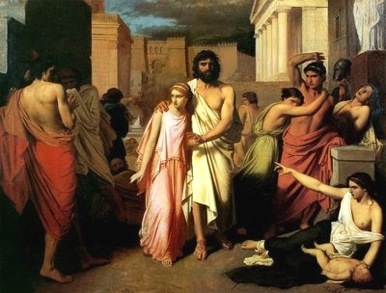Oedipus Rex


Oedipus Rex



The backstory has already been served up on the previous page, so there is no need to pursue it here. We’ll therefore begin with the play. Oedipus is king and the people of Thebes are visited by a plague. They look to their king for deliverance. Oedipus has already sent his brother-in-law, Creon, to Delphi to ask the advice of the Oracle. Creon enters bringing the Oracle’s prediction that Thebes will be freed of the plague when those who killed Laius, the former king, are purged from the city. Oedipus declares that if the culprits will come forth, their only punishment will be exile. The chorus leader recommends that the prophet Tiresias be consulted. Tiresias appears, but refuses to tell what he knows. Oedipus becomes angry and accuses Tiresias of complicity, along with Creon, in the murder. Tiresias, in turn threatens Oedipus with dreadful horrors should the matter be pursued further, but Oedipus cannot stop the inquiry. When he dismisses the old man, he declares the seer to be a fool. “Foolish, perhaps in your eyes, but thought wise by the parents that begot you.” Oedipus, startled at the old man, asks “What man begot me?” Tiresias responds that before the day ends, the king will know all. There follows a series of interrogations of various people who were in one way or another, involved at the murder scene, and were involved in the exposure, rescue and adoption of Oedipus. At each step in the process, Oedipus has the opportunity to drop the investigation, to “move on,” as modern politicians are wont to say. But Oedipus, every inch a hero, will not give up until the whole horrid truth comes out. Finally it is discovered that Oedipus killed Laius, his own father, and in marrying Jocasta, he married, lay with, and fathered children upon his own mother. Oedipus, crying out in horror runs into the palace where he discovers that Jocasta, a bit quicker on the uptake than the king, has hanged herself in guilt and humiliation. Oedipus puts out his own eyes, and asks that he be exiled, and leaves his family and the city.


Oedipus Rex is also about sin, or sin as the Greeks saw it. We are often troubled because the fate of tragic heroes seems unfair. For example, Oedipus did not intend to do wrong; he tried to avoid it. But the Greeks had different ideas about sin from ours. To them, a man committed hubris when he tried to do something that men cannot do. One thing men cannot do is avoid fate. Oedipus thought that he was smart enough to outwit fate. His hubris was to try to be smarter than men can be. In the end, he tears out his eyes because he cannot face the truth about his crime. But Oedipus is not controlled by fate – in a sense, by acting, he brought his own fate upon himself! As weird as this seems to us, Greeks believed that his fate was just and right and that the gods supported it. We will discuss this in class and try to se how this fits in with the Greek view of the hero and the individual.
Oedipus is the best known, and probably the most complex character that has survived from the Greek tragedies. He is a hero with a lot of flaws. His greatest virtue is the key to his downfall. He exhibits moral courage to a fault; he insists on knowing the truth, unnecessarily, even when it becomes obvious that the truth will lead to his downfall. His exaggerated self-confidence is a danger to himself and to his city; it is a danger in a private citizen, and a catastrophe in a ruler. Had the king not doggedly and unadvisedly pursued the truth he might have avoided his fate. Had Oedipus not insisted that Tiresias come forth, the prophet would not have done so. Had he not pushed and prodded, Tiresias would not have uttered his accusations. Step by painful step, as the evidence comes forth, the king has an opportunity to retreat, to leave the riddle unanswered. But that he cannot do. Oedipus is too clever, too curious, too self-confident by far. Like Cassandra in the Agamemnon, Oedipus suffers into truth, but his suffering will continue all the days of his long life.








